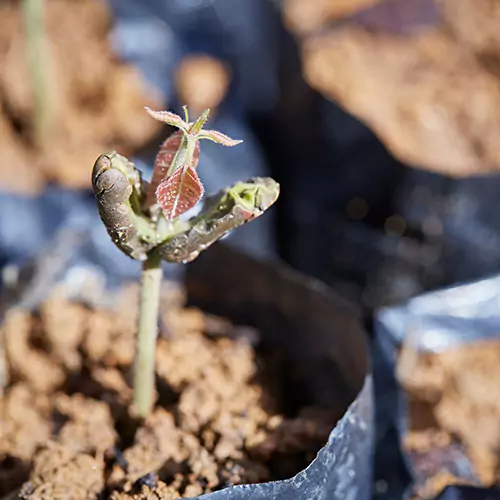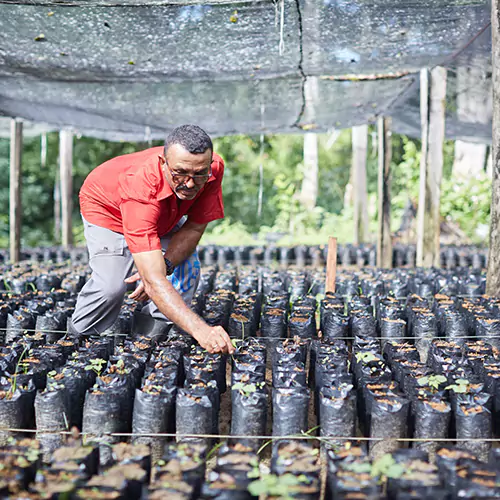Degraded soil affects nearly a third of the Earth's land area. Poor soil management, population pressures, and expensive chemical fertilizers are all factors. This comes at a high cost to the environment and to farming communities who need healthy soil to grow crops.
UN Sustainable Development Goal 15 aims to protect, restore and promote sustainable use of terrestrial ecosystems, including land and soil.
There are many actions we can take to protect and restore degraded soil. These include replacing chemical fertilizer with organic matter like compost, household waste, leaves and pulp. We also train farmers on agroforestry techniques, such as planting forest trees alongside crops to provide shade and enrich the soil when their leaves fall and break down into compost.
Our initiatives include:
- Investing in by-product conversion for our own farms and plantations, replacing tonnes of chemical fertiliser with organic matter
- Training farmers, so that they can:
- Increase organic matter through compost, household waste, leaves, and pulp
- Reduce evaporation by planting agroforestry trees for shade, and intercropping with leguminous trees and food crops
- Use inorganic fertilizers appropriately and access them more easily
Goals and Progress
We report on the goals and targets in the Natural Capital section of our 2020 Annual Report.
We scale our impact through sector initiatives such as:
CocoaSoils - A public-private consortium promoting Integrated Soil Fertility Management (ISFM) to rehabilitate cocoa plantations for better productivity
Monitoring through AtSource+
AtSource+ allows customers to track the measures that are being taken in their supply chain and identify action plans needed to drive further improvement. Relevant metrics include:
Number of farmers in a farmer group trained on soil improvement initiatives
Number of hectares benefitting from integrated soil fertility management
Percentage of non-chemical Integrated Pest Management practices
Phosphorus and nitrogen use efficiency
Perfect partners
Pairing coffee with lemongrass to boost healthy soils in DR Congo
AtSource+ metrics to track progress:
- Farmers in a farmer group trained on soil improvement initiatives
- Farmers in a farmer group who have attended soil improvement training (%)
In the Isale region of Democratic Republic of Congo, a combination of volcanic soil and moisture fed through from the Great Lakes provides fertile ground for coffee farming. But the wet conditions also make the soil prone to erosion and organic degradation.
To combat this, agronomists have shared the benefits of growing lemongrass alongside coffee trees with farmers in Virunga, DR Congo. The fibrous root system of the lemongrass plant has been proven to be an efficient soil binder to strengthen soil structure and prevent erosion. We provide both lemongrass and shade trees free of charge to the farmers most in need and at subsidized prices to all interested growers in the region.
AtSource+ allows ofi and its customers to measure the impact of program like this by tracking metrics such as the number of farmers trained on soil improvement initiatives and the number who have attended soil improvement training.
Read ofi news
Olam believes that California farming is world-class. We have long-standing relationships with farms that have invested heavily in ag-tech start-ups and new technologies to shape the future of the industry and partner with leading environmental organizations to incorporate regenerative practices on farm.
Getting plant nutrition right is increasingly difficult, but essential, in unpredictable climate conditions. As part of their agronomic training, the 570 coffee farmers in the Quindío farmer group have learned how to perform soil analysis in order to calculate the appropriate amount and type of fertiliser required.
In India, Olam Spices has trained nearly 1,000 smallholder farmers on a wide array of soil health practices to promote regenerative agriculture, resulting in high-quality red chilli that is free of pesticide residue, aflatoxin and meets all global food safety standards.
- Transparency in Coverage
- Modern Slavery Statement
- CA Supply Chain Transparency Act
- Transparency in Coverage
- Modern Slavery Statement
- CA Supply Chain Transparency Act
Copyright © 2022
Olam International Limited. All Rights Reserved. Co Reg No: 199504676H





